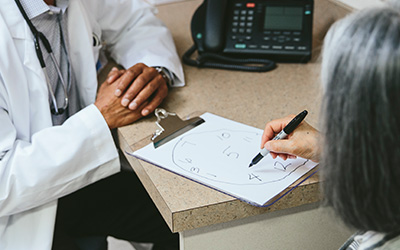Not sure if you should get tested for Alzheimer’s? Here are FOUR REASONS why you should
By
- Replies 3
Alzheimer’s disease (AD) is a progressive brain disorder that damages and eventually destroys brain cells, leading to memory loss, cognitive decline, and, eventually, death. It is the most common cause of dementia, accounting for 60 to 70 per cent of all cases, according to the World Health Organisation.
Early detection of AD is critical for both patients and their families, as it can help with treatment and planning for the future. Here are four reasons why you should get tested for Alzheimer’s disease.
1. Alzheimer’s is a progressive disease.
AD starts out slowly, with mild memory loss and other changes. But over time, symptoms get worse. By the late stages of AD, patients may no longer be able to communicate and may need full-time care. Early diagnosis can give patients and their families time to prepare for the future.
2. There is no cure for Alzheimer’s, but treatments are available.
There is no cure for AD, but treatments can help manage symptoms and slow down the progression of the disease. These treatments can be more effective when started early on.

Credit: A Place For Mom
3. Alzheimer’s can be expensive to manage.
The cost of caring for someone with AD can be significant. Early diagnosis can help patients and their families plan for the future financially.
4. Alzheimer’s can be emotionally devastating for families.
AD not only takes a toll on patients but also on their families. Watching a loved one slowly decline can be difficult. Early diagnosis can give families time to prepare emotionally for the journey ahead.
If you or a loved one is experiencing memory loss or other changes, it’s important to talk to a doctor. Early diagnosis of AD is critical for patients and their families.
There are several different methods and tools that can be used to diagnose Alzheimer's disease. To diagnose Alzheimer’s, doctors may do the following assessments:

Credit: Alzheimer’s Association
Source: US Department of Health and Human Services National Institute of Ageing
To better understand how the patient's memory and other cognitive abilities are evolving over time, doctors may want to repeat these tests.
The tests can also be used to identify additional reasons for memory issues, including stroke, tumours, Parkinson's disease, sleep disorders, drug side effects, an infection, or a different kind of dementia. Some of these ailments might be treatable and even curable.
Once the GP confirms that the patient has developed dementia, they will be referred to a specialist — geriatricians, geriatric psychiatrists, neurologists, and neuropsychologists — depending on the care the patient needs.
Getting tested for Alzheimer's disease is an important step in taking control of your health. Early diagnosis and treatment can make a big difference in managing the symptoms and progression of the disease.
So, there you have it. Be sure to stay on top of your own and your loved one's symptoms, and if you are ever unsure of your own or someone else’s health, simply head to your local doctor for a checkup.
Early detection of AD is critical for both patients and their families, as it can help with treatment and planning for the future. Here are four reasons why you should get tested for Alzheimer’s disease.
1. Alzheimer’s is a progressive disease.
AD starts out slowly, with mild memory loss and other changes. But over time, symptoms get worse. By the late stages of AD, patients may no longer be able to communicate and may need full-time care. Early diagnosis can give patients and their families time to prepare for the future.
2. There is no cure for Alzheimer’s, but treatments are available.
There is no cure for AD, but treatments can help manage symptoms and slow down the progression of the disease. These treatments can be more effective when started early on.
Credit: A Place For Mom
3. Alzheimer’s can be expensive to manage.
The cost of caring for someone with AD can be significant. Early diagnosis can help patients and their families plan for the future financially.
4. Alzheimer’s can be emotionally devastating for families.
AD not only takes a toll on patients but also on their families. Watching a loved one slowly decline can be difficult. Early diagnosis can give families time to prepare emotionally for the journey ahead.
If you or a loved one is experiencing memory loss or other changes, it’s important to talk to a doctor. Early diagnosis of AD is critical for patients and their families.
There are several different methods and tools that can be used to diagnose Alzheimer's disease. To diagnose Alzheimer’s, doctors may do the following assessments:
Credit: Alzheimer’s Association
- Ask the person experiencing the symptoms about their general health, use of prescription and over-the-counter medications, food, prior medical issues, capacity to carry out daily activities, and behavioural and personality changes. Doctors may also ask their immediate family members and loved ones about these questions to better assess the patient.
- Provide a psychiatric examination to evaluate if depression or another mental health condition is causing or contributing to the symptoms experienced by the patient.
- Administer tests for the patient's memory, problem-solving skills, attention span, counting, and language.
- Request blood, urine, and other common medical tests that can help pinpoint further potential reasons for the issues.
- Perform brain scans using computed tomography (CT), magnetic resonance imaging (MRI), or positron emission tomography (PET) to confirm an Alzheimer's diagnosis or rule out other potential causes of symptoms.
Source: US Department of Health and Human Services National Institute of Ageing
To better understand how the patient's memory and other cognitive abilities are evolving over time, doctors may want to repeat these tests.
The tests can also be used to identify additional reasons for memory issues, including stroke, tumours, Parkinson's disease, sleep disorders, drug side effects, an infection, or a different kind of dementia. Some of these ailments might be treatable and even curable.
Once the GP confirms that the patient has developed dementia, they will be referred to a specialist — geriatricians, geriatric psychiatrists, neurologists, and neuropsychologists — depending on the care the patient needs.
Getting tested for Alzheimer's disease is an important step in taking control of your health. Early diagnosis and treatment can make a big difference in managing the symptoms and progression of the disease.
So, there you have it. Be sure to stay on top of your own and your loved one's symptoms, and if you are ever unsure of your own or someone else’s health, simply head to your local doctor for a checkup.







